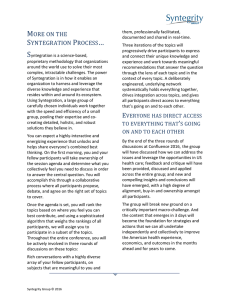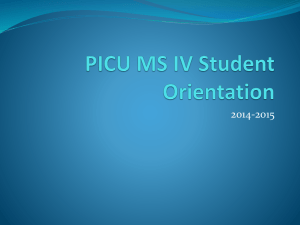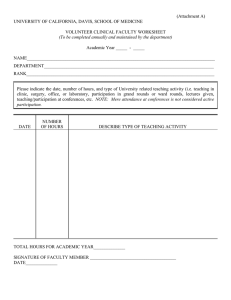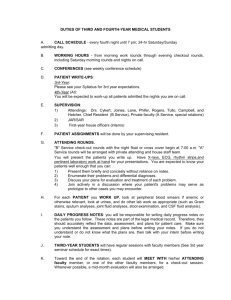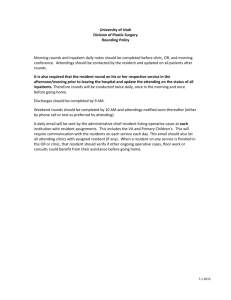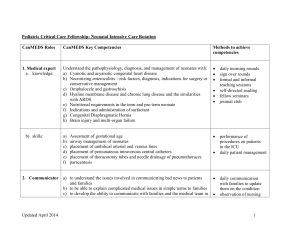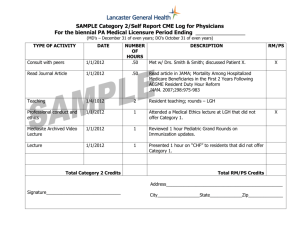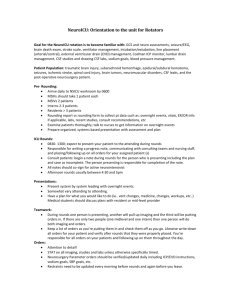UCI MICU Orientation:
advertisement
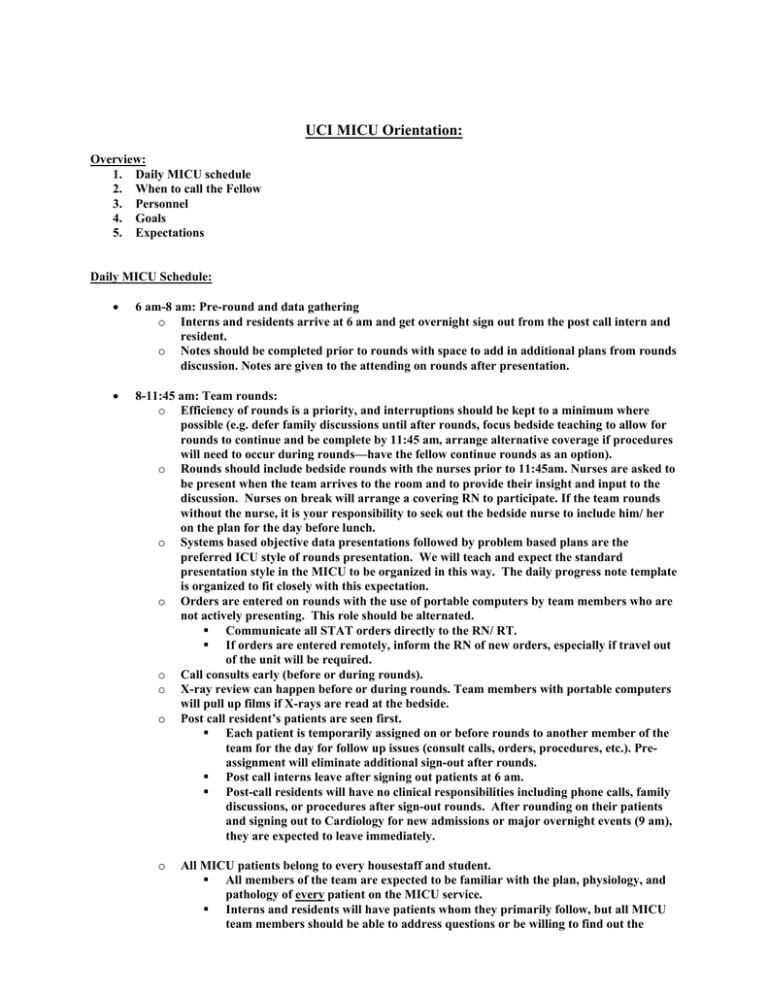
UCI MICU Orientation: Overview: 1. Daily MICU schedule 2. When to call the Fellow 3. Personnel 4. Goals 5. Expectations Daily MICU Schedule: 6 am-8 am: Pre-round and data gathering o Interns and residents arrive at 6 am and get overnight sign out from the post call intern and resident. o Notes should be completed prior to rounds with space to add in additional plans from rounds discussion. Notes are given to the attending on rounds after presentation. 8-11:45 am: Team rounds: o Efficiency of rounds is a priority, and interruptions should be kept to a minimum where possible (e.g. defer family discussions until after rounds, focus bedside teaching to allow for rounds to continue and be complete by 11:45 am, arrange alternative coverage if procedures will need to occur during rounds—have the fellow continue rounds as an option). o Rounds should include bedside rounds with the nurses prior to 11:45am. Nurses are asked to be present when the team arrives to the room and to provide their insight and input to the discussion. Nurses on break will arrange a covering RN to participate. If the team rounds without the nurse, it is your responsibility to seek out the bedside nurse to include him/ her on the plan for the day before lunch. o Systems based objective data presentations followed by problem based plans are the preferred ICU style of rounds presentation. We will teach and expect the standard presentation style in the MICU to be organized in this way. The daily progress note template is organized to fit closely with this expectation. o Orders are entered on rounds with the use of portable computers by team members who are not actively presenting. This role should be alternated. Communicate all STAT orders directly to the RN/ RT. If orders are entered remotely, inform the RN of new orders, especially if travel out of the unit will be required. o Call consults early (before or during rounds). o X-ray review can happen before or during rounds. Team members with portable computers will pull up films if X-rays are read at the bedside. o Post call resident’s patients are seen first. Each patient is temporarily assigned on or before rounds to another member of the team for the day for follow up issues (consult calls, orders, procedures, etc.). Preassignment will eliminate additional sign-out after rounds. Post call interns leave after signing out patients at 6 am. Post-call residents will have no clinical responsibilities including phone calls, family discussions, or procedures after sign-out rounds. After rounding on their patients and signing out to Cardiology for new admissions or major overnight events (9 am), they are expected to leave immediately. o All MICU patients belong to every housestaff and student. All members of the team are expected to be familiar with the plan, physiology, and pathology of every patient on the MICU service. Interns and residents will have patients whom they primarily follow, but all MICU team members should be able to address questions or be willing to find out the answers to issues on every team patient. Please do not EVER answer a question about a patient on our service by saying “Sorry,not my patient.” To facilitate this goal, each team member needs to hear the discussion on every patient every day. Team rounding is encouraged. Resident Spectralink phone: ext 2348. The phone is meant to facilitate communication between RNs, MDs, and consult services. The resident holding the phone has responsibility to answer or get answers to the questions coming to the phone. Fellow Spectralink phone: ext 2353. The phone is provided to facilitate communication between RNs, MDs, and consult services. The fellow has responsibility to answer or get answers to the questions coming to the phone. 11:45 am – 12 pm: o Schedule family meetings in concert with social work for the afternoon between 1-3 or after 4. o Complete orders and notes. 12-1 pm: o Attendance at noon conference, grand rounds, or M & M is encouraged. 1-3 pm: Team members are expected to be in the ICU during the afternoon engaged in patient care activities and education. o Procedures: page the fellow and attending if they are in house to inform them when you are doing any procedure. o Bedside teaching o Family meetings o Work o Re-examination of patients before afternoon rounds (required) o Fellows must be involved in and/or informed of: Any new admission Any new hemodynamic instability Any significant change of respiratory status including deterioration or improvement warranting extubation Any invasive procedure Significant changes in patient care plans determined on morning rounds See below for expanded list of issues requiring fellow involvement. 3-5 pm: Sign out rounds and teaching: o At a time to be determined by the attending, the team will meet in the workroom in unit 74 to touch base, provide brief, focused updates, follow up on studies, and discuss overnight plans and goals. This meeting serves as preparation for sign out to the night intern/ team on call with regard to goals and contingency plans. The night team arrives just before 6 pm to receive signout. There should be no major surprises about which the fellow and attending are not already aware. ? o’clock: ICU curriculum series: o Didactic teaching by the attending occurs at a time that works best for the circumstances of the day. o Teaching sessions will cover key core subjects so that every rotating group of trainees receives a standard ICU curriculum. Attendings will coordinate with one another to provide a full curricular experience. 6pm: o o When all procedures, meetings, and urgent follow-up on patients are completed, interns who are not on call are expected to leave by 6 pm. Work hours violations are not acceptable. If housestaff is in jeopardy of a work hour violation, he/she should alert and work with the attending to obtain coverage so that violations do not occur. o Residents alternate staying until sign out to the night team at 6 pm. The other resident should leave when all procedures are complete and before 6 pm. 6 pm-overnight: o The ICU Call team consists of an intern and resident who arrive just prior to 6 pm to receive signout from the day residents of both the MICU and CCU teams. o The fellow should be paged for assistance when required and any time additional advice or back up is needed. o The MICU attending on call is available to the fellow or on call intern at all times by pager and in person if a crisis requires their presence. 6 am, post call day: o Post Call intern signs out to incoming interns for the CCU and MICU. o Post Call Resident signs out to incoming MICU and CCU residents. 9 am, post call day: o Post Call Resident breaks away from rounds to sign out to CCU attending/ fellow any new admissions or major changes in CCU patient status. If no new admissions and no major overnight events on the CCU team, then this meeting is not required. When to call the fellow (day or night): Admissions/ Patient care: o When in doubt about whether to call the fellow or attending for help, err on the side of calling. o Any admission or consult request. Housestaff should not refuse admissions without fellow or attending approval. o Any new admission as soon as possible after initial evaluation has occurred o Anytime the resident is busy with an admission or unstable patient while additional urgent patient care needs arise. Neuro: o Any significant deterioration in neurological exam (call Neurocritical care first and initiate appropriate treatment ASAP) o Any patient or family member threatening to harm themselves or others (call security and psychiatry simultaneously) o Any patient asking to leave AMA Respiratory/ Metabolic: o Any rapidly escalating oxygen requirements, any patient newly on 100% FiO2, or for adjustments in APRV or Pressure Control vent settings when guidance is needed o Significant and refractory respiratory or metabolic acidosis (pH <7.25) or rising lactates despite resuscitation o Any new or significant deterioration of respiratory function that may require increased level of mechanical support (NIPPV or mechanical ventilation) o Any significant improvement of respiratory function that may allow for extubation. Do not extubate a patient without fellow approval. Ideal extubations occur during daytime hours when senior MICU team members are present to help handle any issues. Hemodynamic: o New or refractory hemodynamic instability o Hypotension not responsive to fluids and requiring significant escalation of pressors o Life threatenting arrhythmias or EKG abnormalities (VT, VF, acute coronary syndromes, unstable brady or tachycardias) o Any codes or threatened code situations Renal: o Acute oliguria or anuria not responsive to fluids o Urgent hemodialysis required GI/ Heme: o 3 U PRBC or more transfusion needed in < 8 hours o Significant, life threatening and persistent bleeding Invasive procedures: o Any patient requiring emergent surgery or emergent IR procedure o Any invasive procedure that the intern and covering resident are not comfortable performing without supervision o All chest tubes, central arterial lines, pulmonary artery catheter placements, and intubations. o Any accidents or iatrogenic complications that cause harm to patients or staff Personnel: 1. First line of call is MICU resident by day. The MICU resident responds to admission pages, RRTs, and Code Blues. Significant back up from the team is available when the MICU resident is occupied. 2. The ICU fellow is present by day, and takes home call at night. Use guidelines in addition to common sense about when to get them involved in any issues. 3. The ICU attending is ultimately responsible for all patients. Call the attending for all deaths, expected or unexpected, any significant iatrogenic injury, any safety issue, for additional hands during busy times, and for all daytime procedures. 4. The ICU nurses are an excellent source of information. Ask them what they think and what they need to care for the patient. 5. The Respiratory Therapists (RTs) are the ventilator and pulmonary therapy experts. Enlist their help and make them aware when adjusting ventilator settings or choosing new courses of treatment. RTs will request and arterial line if a patient is reasonably expected to need more than 4 ABGs. It is the housestaff’s responsibility to enlist the fellow and attending to supervise and/or perform any procedure that they need help with. 6. ICU clinical pharmacist is available during most rounds and during regular work hours for all questions relating to drugs. 7. ICU Social Workers and Case Managers are most helpful in dealing with family and psychosocial issues as well as disposition. Inform them early in the day if you have a patient who will require their involvement. 8. ICU nutritionists are available to help with enteral and parenteral dietary recommendations. 9. The Hospital Spiritual Care department and Palliative Care Service can be instrumental in helping patients and families navigate through critical illnesses. Goals: 1. At the end of your rotation you will not be expected to be able to independently manage airways, ventilators, complicated procedures, or ICU patients alone. This is not the goal. 2. Learn, either by experience or didactic sessions, to deal with common medical emergencies. 3. Learn to manage complicated patients over their entire ICU course. 4. Learn which patients are appropriate for the ICU, which are not, and when to transfer patients to lower levels of care. 5. Practice managing complex issues given limited time by prioritizing, delegating, and becoming efficient. 6. Learn to function as an integral member of a team with inherent differences in style and fund of knowledge. 7. Learn how to act safely, maintain calm, and achieve confidence in urgent and emergent situations. 8. Become familiar with basic bedside ultrasound indications, learn introductory point of care scanning techniques, and gain skill in volume and cardiac assessment. 9. Learn about critical care patient management through bedside teaching, didactics, personal investigation, and research. Expectations: 1. Examine all of the patients on whom you write notes personally before morning and afternoon rounds and have notes ready before morning rounds. 2. See all team patients daily, even when you are not the primary physician for the day. 3. Abide strictly by work hours regulations 4. Talk to all families/surrogates as soon as possible and maintain daily contact. This is a time consuming process but is critical to excellent patient care. 5. Document all contacts with families and surrogates to enhance communication with care providers and to provide medico-legal documentation– a brief note is all that is required 6. You are not expected to handle difficult ethical or end of life issues on your own. The ICU fellow and or attending are there to help in these situations when necessary. 7. Communicate with PMDs on admission and regularly thereafter when appropriate. 8. Learn a lot, have fun, and be a great teammate. For questions: MICU Director: Mohsen Davoudi, MD mdavoudi@uci.edu Pager 714-506-6620 Updated 11/12
